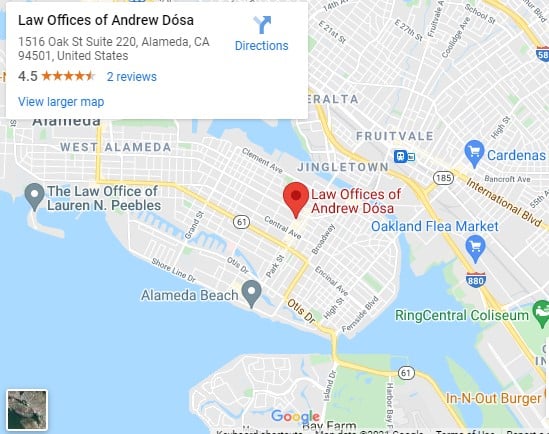Are you planning to write a will? If YES, below are seven key elements to create an effective will. If you need guidance in writing a will, you can reach out to our Alameda California estate planning attorney.
Establishing Statutory Framework
Testamentary Intent. Generally, a Will is understood to be writing or controlling the disposition of the testator’s property at death. But let’s start with the central characteristic of a Will. The testator must intend the document to be his Will; he must have testamentary intent. Any document directing the distribution of the testator’s property must have been written with the author intending it to be his Will. There are no magic words, formulaic structures, and no statutory mandated phrases. The document does not even have to be called a “Will” and that word need not be used.
The basic test of testamentary intent is not the testator’s realization that he was making a will, but whether he intended by the particular instrument offered for probate to create a revocable disposition of his property to take effect only upon his death. [Citations.] No particular words are necessary to show testamentary intent but it must satisfactorily appear from the proffered document that the decedent intended by the very paper itself to make a disposition of his property after his death.
What the Probate Code Says (Prob. C. Sec. 6110).
(a) Except as provided in this part, a will shall be in writing and satisfy the requirements of this section.
(b) The will shall be signed by one of the following: (1) By the testator. (2) In the testator’s name by some other person in the testator’s presence and by the testator’s direction. (3) By a conservator pursuant to a court order to make a will under Section 2580.
(c) Except as provided in paragraph (2), the will shall be witnessed by being signed, during the testator’s lifetime, by at least two persons each of whom (A) being present at the same time, witnessed either the signing of the will or the testator’s acknowledgment of the signature or of the will and (B) understand that the instrument they sign is the testator’s will. If a will was not executed in compliance with paragraph (1), the will shall be treated as if it was executed in compliance with that paragraph if the proponent of the will establishes by clear and convincing evidence that, at the time the testator signed the will, the testator intended the will to constitute the testator’s will.
The particular things you will want to include in your will, generally, are:
- The testator–the person who creates the will,
- The testator who has capacity
- Statement of intent
- Beneficiaries (including successor beneficiaries or contingent beneficiaries),
- Assets to be distributed and adequately described and that characterized (specific gifts and residual distributions,
- Representatives and successor representatives,
- Ways of resolving conflicts (setting out specific instructions or giving the successor executor discretion),
- Instructions for amending or revoking (or the statutory rules and case law control),
- Strict adherence to rules regarding the formation of the particular type of Will, such as witnesses for the traditional Will, and the attestation clause.
The two core requirements of a valid Will are meeting the legal formalities of the particular Will and the competent testator acting with testamentary intent. The formatting of the Will is not significant. You can have almost any format and any order in your Will. The courts place paramount focus and emphasis on the intent of the testator. That controls everything. Substance controls form.
However, having said that, there is a basic structure to an organized Will, and drafting according to this general pattern or format will reflect on you. Your product will be better if it is well organized. Also, the better the document is, the less likely you will face a contest later when you would have to testify and cover your product.
Four Types of Wills
California law requires that every Will be written, but it can be in one of four forms, a typewritten instrument, a handwritten document, called a holographic Will (Probate Code Sec. 6111), a printed form (Prob. C. Secs. 6200-6243), or a letter. However, the Probate Code controls, and a document that does not comply with California’s statutory requirements regarding any of the four types of Wills is not a Will. The Probate Code recognizes a witnessed Will (Prob. C. Sec. 6110), a holographic Will (Probate C. Sec. 6111), the California statutory Will (Prob. C. Secs. 6200-6243), or an international Will (Prob. C. Secs. 6113, 6380-6390).
Age. Probate Code Section 6100 states a person ordinarily must be 18 years of age to make a Will. The three exceptions are a person under 18 who has a valid marriage, is on active duty in the military, or has received a judicial declaration of emancipation (Family Code section 7122).
Mental competence/capacity. “A Sound (Beautiful) Mind (Probe. C. Sec. 6100)”. When the Will was executed, the person must have been of sound mind. Evidence of the unsound mind before or after does not control. The Statutory Standard for Determining Mental Competence (Probe. It C. Sect. 6100.5): If there was a Will Contest, challengers of the Will have two chances to show the person was not mentally competent at the time he made the Will. First, the contestants would prevail if they can show the person did not have sufficient mental capacity to
- understand the nature of testamentary,
- understand and recollect the nature and situation of his or her property, or
- remember and understand his relations to his living descendants, spouse, and parents, and those whose interests are affected by the Will.
Second, the contestants would prevail if they can show the person suffers from a mental disorder with symptoms including delusions or hallucinations, and these delusions or hallucinations result in the person devising her property in a way she would not otherwise have done.
Probate Code Rules–Evidence of Mental Deficit
Probate code sections 810 – 813 contain special rules for evidence of a person’s lack of capacity. The determination is based on evidence of a “deficit” in mental functioning rather than on a diagnosis of a mental or physical disorder. There is a rebuttable presumption that all persons have the capacity to make decisions and to be responsible for their acts or decisions. Prob. C. Sec. 810. This presumption shifts the burden of proof to the contestants. The next two sections, 811 and 812, prescribe a minimum level of evidence of the testator’s unsound mind or lack of capacity. The sections do not directly amend or revise the standard under Probate Code Sections 6100 and 6100.5 for determining when a person is not competent to make a Will.
Probate Code Section 812 specifically addresses the ability a person must have to communicate a decision and to understand and appreciate all of the following: (a) (a) The rights, duties, and responsibilities created by or affected by the decision, (b) The probable consequences for the decisionmaker and, where appropriate, the persons affected by the decision, (c) The significant risks, benefits, and reasonable alternatives involved in the decision.
Probate Code Sec. 811 provides that a determination a person is of unsound mind and lacks the capacity to made a decision or do an act “shall be supported by evidence of a deficit in at least one of the following mental functions, subject to subdivision (b), and evidence of a correlation between the deficit or deficits and the decision or acts in question:
- Alertness and attention, including, but not limited to, the following:
- Level of arousal or consciousness.
- Orientation to time, place, person, and situation.
- Ability to attend and concentrate.
- Information processing, including, but not limited to, the following:
- Short- and long-term memory, including immediate recall.
- Ability to understand or communicate with others, either verbally or otherwise.
- Recognition of familiar objects and familiar persons.
- Ability to understand and appreciate quantities.
- Ability to reason using abstract concepts.
- Ability to plan, organize, and carry out actions in one’s own rational self-interest.
- Ability to reason logically.
- Thought processes. Deficits in these functions may be demonstrated by the presence of the following:
- Severely disorganized thinking.
- Hallucinations.
- Delusions.
- Uncontrollable, repetitive, or intrusive thoughts.
- Ability to modulate mood and affect. Deficits in this ability may be demonstrated by the presence of a pervasive and persistent or recurrent state of euphoria, anger, anxiety, fear, panic, depression, hopelessness or despair, helplessness, apathy or indifference, that is inappropriate in the degree to the individual’s circumstances.
The statute does not say every mental function deficit is enough. The deficit must be significant, and “impair the person’s ability to understand and appreciate the consequences of his or her actions with regard to the type of act or decision in question.” The frequency, severity, and duration of periods of impairment should be considered. A diagnosis of a mental or physical disorder, by itself, is not enough to meet this standard.
How Mental Illness Influences Will. A lack of testamentary capacity is not proven by the mere fact the testator had a mental illness. It seems something akin to the concept of materiality is at play here. The disorder or illness directly influenced the terms of the Will. What would the person have done but for the disorder or illness? In other words, the Will had terms that were there because the illness affected the person to do something he would not have done.
- A Conservatorship does not Eliminate Capacity – Being conserved is like having a mental illness or disorder regarding the capacity issue. By itself, it is not dispositive. A conserved person is presumed to have testamentary capacity. So it comes back to the evidence: does the person have capacity? What are the facts supporting the conservatorship? They may correlate to the facts showing capacity. Also, facts suggesting deficits may be negated by evidence showing the testator was of sound mind and the deficits do not directly affect the Will.
- Eyewitnesses/Opinion Evidence – Lay and expert witnesses can offer opinions about the soundness of the mind of the testator. The estate planning attorney, a prior attorney, witnesses to the Will, friends, and acquaintances of the testator and physicians, and other expert witnesses all have opinions and evidence to offer.
A common paragraph in an attestation clause is: We are acquainted with [testator]. At this time she is over the age of eighteen (18), and to the best of our knowledge, she is of sound mind and is not acting under duress, menace, fraud, misrepresentation, or due influence.





